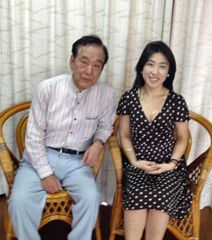Japan Times reporter writes about the current state of affairs for the Okinawan dialect

Ayako Mie, who reported on the 40th anniversary of Okinawa's reversion from U.S. rule to Japanese sovereignty from the cultural aspects of Okinawa, at the Ginowan residence of Susumu Taira, who was designated as a Protector of Intangible Cultural Properties (Ryukyuan Song and Drama).
June 11, 2012 Sadao Tome, Correspondent of the Ryukyu Shimpo
On the occasion of the 40th anniversary of Okinawa’s reversion from U.S. rule to Japanese sovereignty, Japan Times reporter Ayako Mie visited the prefecture for four days at the beginning of May, reporting about the current situation of the Okinawan dialect, Uchinaguchi. Mie published the articles about the gradual demise of Uchinaguchi in the Japan Times. She interviewed three people involved in Uchinaguchi – Byron Figa and Masamitsu Kohatsu, comedians who launched the comedy group Owarai Beigun Kichi, or Comedy U.S. Base, to caricature issues related to the U.S. military bases in Okinawa, and Japanese Brazilian Akira Uema. Before carrying out her interviews, Mie met Eikichi Hateruma, professor of the Okinawa Prefectural University of Arts, and did some research into the historical background of Uchinaguchi.
Mie wrote about how Figa, who was born to an American father and an Okinawan mother, writes columns for newspapers and constantly strives to promote Uchinaguchi. She wrote that Kohatsu satirizes the issues surrounding the U.S. military bases in Okinawa for comedy performances that use a great deal of Uchinaguchi. Third-generation Okinawan Brazilian Uema, who was born in Brazil, bought textbooks on Uchinaguchi through Amazon.com and studied them every day. Although Uema came to Okinawa to study Uchinaguchi to a deeper level, he was disappointed to find that few young people in Okinawa could actually understand the language. Mie wrote about how Uema decided that if Okinawan people would not strive to preserve their beautiful language, he would try to promote it by himself.
After graduating from university in 2001, she started to work for Tokyo Broadcasting System Television. She was awarded a Fulbright Scholarship, which allowed her to study at the Berkeley Graduate School of Journalism in the University of California, where she wrote her masters thesis on the topic of Okinawa. In the thesis, she made reference to Chogi Higa, Takeo Knashiro and Sadao Tome as Okinawan journalists active in the United States.
In her articles Mie pointed out that although language and culture are recognized as the most important factors for forming a person’s identity, the mainstream English media hardly ever refer to the discrimination and colonialist attitudes taken towards Okinawa from those perspectives. Mie said that lately the mainstream English media does not show any interest in the issue of the U.S. military bases in Okinawa, so she wanted to describe the path that the Okinawa people followed for the last 40 years, from different perspectives than those of the U.S. military issue.
(English translation by T&CT, Mark Ealey)
Previous Article:Ikeda Shokuhin produces smoked shima-dofu using unsold tofu
Next Article:BURGER KING to opens its first outlet in August in Okiei Street, Naha
[Similar Articles]
- LA Times article about an Okinawan attempting to keep Okinawan language alive
- Uchinaguchi class of the Okinawa Association of America marks its 9th anniversary
- Okinawan pronunciation added in Kumiodori play script
- Okinawan American veteran used Uchinaguchi to save local residents during the Battle of Okinawa
- Let’s sing Uchinaguchi
 Webcam(Kokusai Street)
Webcam(Kokusai Street)


